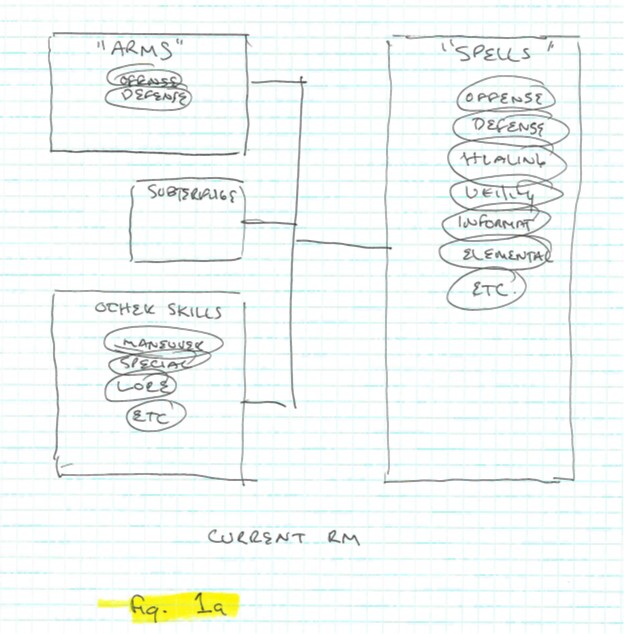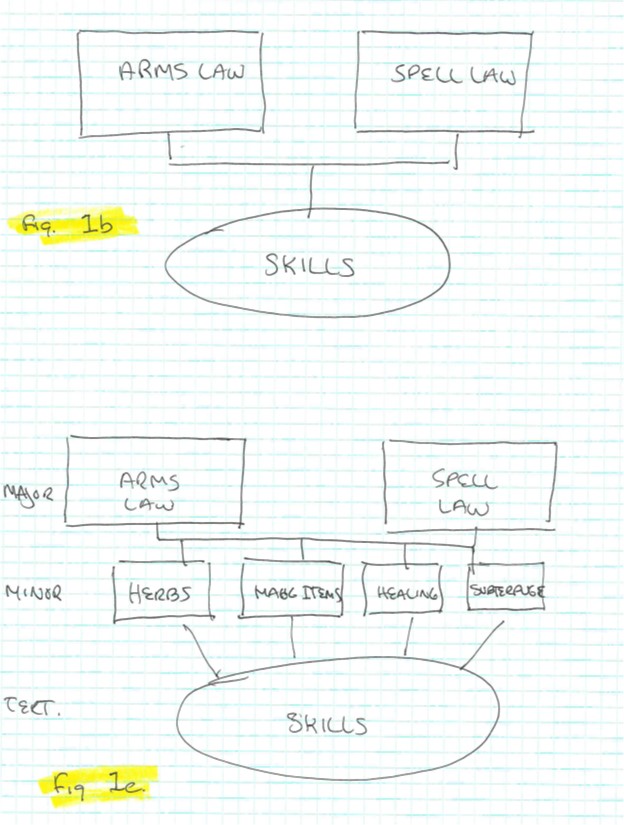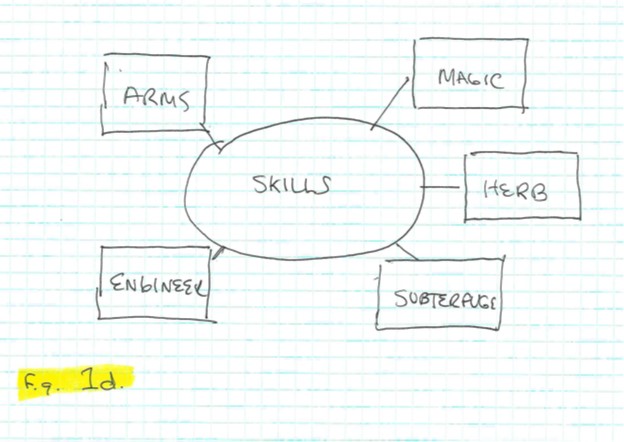
First, that’s a confusing blog title, but I couldn’t think of a better description for what I wanted to discuss!
So what do I mean by core systems? In Rolemaster, these are groups of skills that are the underpinning of a Profession(s) and typically cost 40-60% of DP per level. In Rolemaster, the core systems are combat & magic. Arms Law and Spell Law.
Are there any other of these core systems in Rolemaster that are embraced by a Profession? In non RMU editions of Rolemaster it’s my opinion that there is only one other core system used to build a Profession: the Thief, which is built around Subterfuge systems. Now, the subterfuge system is really a handful of trope skills; there is no “Subterfuge Law” that fleshes out this system, but one could certainly be made. How would that look?
- Subterfuge. Without falling down the rabbit hole of RMSS skills, the predominant subterfuge skills are probably: stalk/hide, perception, pick locks, and disarm traps. Key secondary skills are trickery, disguise, pick pockets and a few others. For me, that’s a great starting point for “Subterfuge Law”, an expansion of these skills into a full blown core. There are probably 4-8 professions that are already built in various supplement or could be built. A few of the top are Thief, Assassin, Spy, Con-artist, Magician (the trick kind not the spell user). Those 5 alone represent interesting variations of subterfuge and could be great additions to a party. There is enough of a foundation to expand the skills, add gameplay material and build a “Subterfuge Law” of 30-50 pages.
Rolemaster also has the kernels of several other systems that could be expanded or developed, for another set of Professions. The framework, ideas, skills and spells are sprinkled around the original rules, companions and supplements, perhaps the most significant of which is the Alchemy Companion. AC is a fantastic resource and while I would reorganize items, and “de-spell” much of the material, the information is there. So what are these other systems?
- Engineering. For a lack of a better category name, “Engineering” includes sciences, mechanical engineering, alchemy (chemistry) and crafting/building. I want to note that these skills would not reside in spell lists (that would fall under the magic system) and does not include enchanting magical items. (Although it would entail fabricating items that could be enchanted). These skills encompass engines, gears, automata, springs, mechanical devices, chemical interactions, explosions, complex devices, alloys, composites and similar production. I believe RMU has moved in this direction with the Delver, but unfortunately, imbued most of the skills and abilities through spell lists rather than mundane skills and lores. However, this also includes the fabrication and use of already enchanted materials (laen, ego etc). Are these skills and sciences enough to support a PC or NPC? I think so, but it’s certainly dependent on the setting as well. The skills, technology, devices and crafts can easily be fleshed out with existing materials in RM supplements, and would make for a versatile and interesting character. What professions could be based around an Engineering Law? Tinkerer, Delver, Inventor, Sapper, Armorer, Gunsmith, War Engineer, Alchemist (for clarity, I use “Enchanter” in place of the traditional RM Alchemist profession).
- Herbalist/Pharmacist. Rolemaster was one of the first, if not the earliest games, to introduce a robust system of herbs & plants that provided magical or pharmacological benefit. Of course this was driven by Middle Earth’s depiction of Mirenna /Mirgalen and King’s Foil, but is now a integral part of RM in general and built into Shadow World as well. Would anyone play a “Herbalist”? Both Animists and Druids have low Herb Lore skill costs and herbs are part of their professional DNA, but I’m promoting the idea that “herbs” could be expanded into a core system akin to combat, magic, subterfuge or engineering that could also anchor new professions. There are already many categories of herbs: medicinal, enhancements, poisons, healing, and antidotes. This can be expanded into cooked or mixed “food” products: breads, spirits, beers, wines or other plant/food based formulae. Rare recipes and formulas would provide for unique non-magical effects similar to spells. I think with enough expansion of the “herb system” it can become just as viable as the others and support a character built. Some Professions built around “Herb Law”: Animist (revive the name as a non-magic user), Witch (again non-magic), Herbalist, Brewer, Pharmacist, Physician, Apothecary, Druggist, Poisoner. Some may see these professions as better NPC, support roles, but many also saw the original Astrologer, Alchemist, Lay Healer and Seer as poor PC’s as well. A fleshed out 30-50 page “Herb Law” could broaden the scope of these professions and provide examples that could fire the interest of players.
Assuming that Subterfuge Law, Engineering Law and Herb Law were developed and became equal pillars along with Arms Law and Spell Law, I believe it would add to Rolemaster as a game system and change new gamer’s perceptions of RM. Another benefit is increasing the role of non-spell users and non-magical skills. I think the trend of encoding every new ability or skill as a spell only increases the advantages of casters and devalues regular skills in general.
These aren’t new or novel ideas, it’s just a matter of re-organizing information and EMPAPHIZING these cores as a inherent part of Rolemaster. Sure, hack and slash adventures will probably revert to the offensive abilities of a fighter or magician, but in a more expansive campaign these skill sets could add more depth–and fun!
So, let’s tie this into Shadow World. For those that are familiar with the setting, SW has an extensive range of technology from ancient Althan advanced tech, to tech/magic fusion used by the Worim and Jinteni to current advances in tech from Namar-tol (sky barges and gunpowder), Sel-kai (bicycles), clockwork devices, clip-bed dart guns etc. These groups and societies will have “Engineers” and similar professions to develop, built and use this technology. (Reminds me of “Gnomes” in some D&D settings). In low magic settings, RM Engineers could fill the gap and replace the use of magic-items with cool tech.
Herbalists also have a major role in Shadow World. SW has adopted and expanded RM’s herb list and Terry has introduced new herbs and substances in subsequent publications. Useful herbs can be seen as either natural with medicinal or beneficial properties or “magical”, Essaence-infused flora. Many of the populations in SW are low tech indigenous cultures that would rely on natural remedies rather than high level healing spells. Expanding and creating “Herb Law” adds yet another core system that builds upon Rolemaster and adds to SW world-building.
Per the comment below, here are some rough diagrams that I used.

Fig. 1a. This is how I see RM in it’s current form. On the left you have “Arms Law” which is robust combat system that support non-spell users. On the same side, but not quite as robust or organized is subterfuge skills which are the core of the Thief profession. Finally there are all the skills that are used in Arms Law, Subterfuge and elsewhere that can be drawn upon by all Professions with varying costs. On the other side is Spell Law. Under the umbrella Ment/Chan/Ess and the hybrids, you basically have spells that mirror or replicate everything on the left side. Add in the Companions and support material and you basically can achieve any physical, combat or skill effect with a magical spell. Whether you see that as a feature or a bug of the system, that makes all mundane, non-magical abilities only necessary for the handful of non spell users.

Fig. 1b. This is a more simplistic diagrame of RM. You have Arms Law & Spell Law that draw from a pool of skills contained in Character Law. This diagram implies a balance between Arms and Spell.
Fig 1c. This is a more nuanced view of Rolemaster. You still have Arms Law and Spell Law, but there are secondary support systems that have more robust rules: herbs, making and using magical items, healing and the bundle of subterfuge skills. Below that are miscellaneous skills of varying utility, design, purpose or value.

Fig. 1d. This shows my current mental model for this blog. I’ve defined 5 core systems that make up the core of certain Profession types/groups. All of them draw from the a shared pool of skills.

A key core area of subterfuge for thief-like professions. Then again you could say that Healing is another Core area. I’m not looking at the books right now but I’m pretty sure that is another core. Then there are the Lores – for bards, Astrologers, and presumably, if they had any purpose in an adventure the researchers/inventors/general knowitalls.
I have to admit I had never really made the connection. There is probably some cool Venn diagram we could draw to help understand the relative use of different core domains of skills by professions. With that knowledge, a good adventure writer would be able to decide what professions should be considered to be successful. GMs could balance tasks across their party when planning encounters. Players would balance out the party skills based on cost rather than on a grudging acceptance that “someone” has to do it.
I initially started with Healing as another but ultimately didn’t fit my criteria:
1. There had to be enough skills/abilities to support Profession(s) build.
2. It could not be a majority of another CORE.
3. There was enough material that it could support a supplement.
4. It had to be interesting and broaden RM appeal to new players and/or other settings.
Healing certainly meets #1 & #3. However, the majority of healing in RM is done via spells (magic core) with a minority using herbs/substances (Herbalist Core) so it doesn’t meet #2. I’m not sure about #4. For instance the Engineering Core might be useful if the Rolemaster rules were used in a Warhammer or Steampunk setting.
I have some diagrams I’ll post up in the post above–there aren’t Venns, but more of mental mapping.
To be honest I was thinking of the healer core more as the non-spell user version in a similar vein to Hands of a Healer. So in a way, it has already been done; at least in a Middle Earth way. Engineering core should be useful in Shadow World as well where technology is still used, even if regarded as magic.
I like the idea of new classes built for different core functions like Engineering. In fact, I plan to make a Dabbler variant called an Engineer, which is more like the Pathfinder 2 Alchemist class (a kind of combat engineer, who uses magical bombs and concoctions on the battlefield). That’s more spell focused though.
One question I think that would need to be solved to give these new classes more non-spell options would be how you do that without contributing to skill bloat. RM2’s companions offered many new classes, but differentiated many of the arms classes by introducing new skills, and that got out of hand pretty quickly. You do touch upon this above of course. I’m just not sure how exactly that would work.
That’s a good point, and I am a minimalist when it comes to adding new skills. I think that 4-6 skills would do it; at a 2/5 cost that’s 30-40 DP’s per level, so more than the 50% thresh hold I’m using for a CORE focus.
As an aside, HARP produced a Martial Law book (for what we would call Arms users focused on combat), with a Subterfuge book currently in the pipeline (which will look at Arms pure and semi users focused on stealth). There is also College of Magics (equivalent of arcane nagic) and Beyond the Veil (upcoming, equivalent of divine nagic), so an arns/spell split with some granularity on subtypes within each.
Regarding enhancing option for skill users, I think the easiest option is Talents – possibly with skill rank requirements, to use existing skills in new ways. The cost and skill requirement would deter spell users from heavily investing, whilst still allowing the option to be available for non spell users.